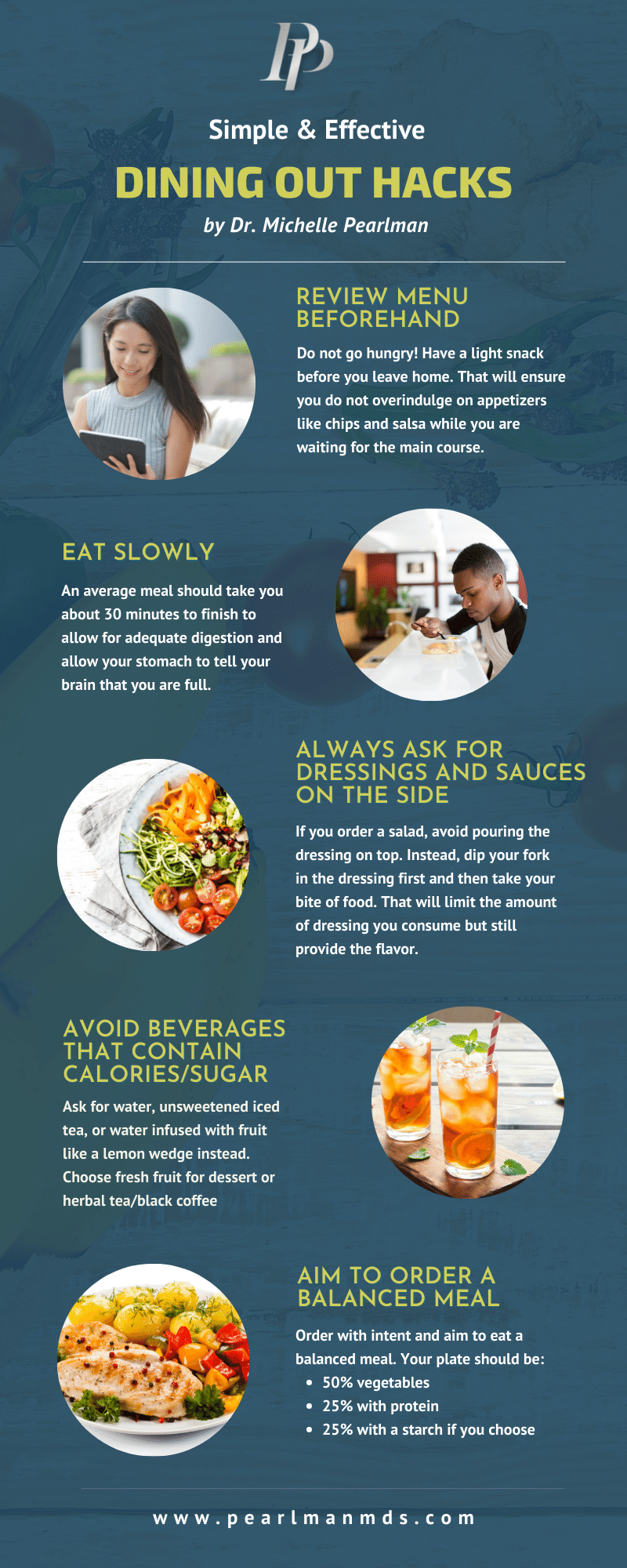Did you know that you can still dine out while staying on track with your health and nutrition goals?
Here are some of Dr. Michelle Pearlman’s dining out hacks to help limit excessive calories, saturated fat, and sugar to protect your waistline as well as reduce common GI symptoms:
- Review Menu Before (Browse the online menu to familiarize yourself with the options)
- Eat lighter during day
- Do not go hungry! Have a light snack before you leave home. That will ensure you do not overindulge on appetizers like chips and salsa while you are waiting for the main course.
- If you have a food allergy (i.e. peanuts) or autoimmune condition like celiac disease, make sure you tell your server so that they can help you navigate the menu and choose options that do not contain these ingredients.
- Try to eat slowly and enjoy the meal and your company.
- An average meal should take you about 30 minutes to finish to allow for adequate digestion and allow your stomach to tell your brain that you are full.
- Half of a plate is likely still too much, visualize portion at home & replicate portions on the plate at the restaurant
- Always ask for dressings and sauces on the side
- If you order a salad, avoid pouring the dressing on top. Instead, dip your fork in the dressing first and then take your bite of food. That will limit the amount of dressing you consume but still provide the flavor.
- Order vegetables as side dishes. Many restaurants offer steamed or grilled options
- Choose non creamy dressings and have them on the side (i.e. olive oil and vinegar)
- Limit calorie dense toppings on salads like cheese and croutons and high sugar items like dried fruit
- Limit or avoid beverages that contain calories/sugar and sweeteners (even diet sodas). Artificial sweeteners and sugar sweetened beverages stimulate reward centers in your brain and make you crave more sugar
- Ask for water, unsweetened iced tea, or water infused with fruit like a lemon wedge instead
- Choose fresh fruit for dessert or herbal tea/black coffee
- Do not be afraid to ask your server questions about how the food is prepared (steamed versus grilled versus baked etc), and about the ingredients. They may not know the answer, but they can surely find out.
- Ask the server to bring a carry out container when they bring your food so you can box half of the meal from the start so you are less tempted to eat then entire plate
- Order with intent, balanced meal (plate should be mostly vegetables about 50%, 25% with protein and 25% with a starch if you choose)
- If you do not see an option on the menu that you want or that is in line with your dietary preferences, you can ask the server to prefer a meal within reason using items that are found in other meals. Examples include:
- If the menu has a tomato, arugula and grilled chicken pizza, you can ask if they can make you a salad with arugula, tomato and chicken and have olive oil and vinegar on the side.
- If the menu has stir fried vegetables, you can ask for the same vegetables steamed (to reduce calories from the added oils and sauces).
- If the menu has a grilled chicken sandwich, you can ask for the grilled chicken breast without the bun either on a salad or with steamed or grilled vegetables on the side.
Food Preparation 101:
- When dining out, mode of food preparation plays a critical role in how many calories and types of calories you consume, as well as GI symptoms. Excess oils, marinades with added sugar, spices, and/ or creamy sauces can often lead to gastrointestinal symptoms like heartburn, bloating and diarrhea.
- Foods that are raw, steamed, grilled, or boiled contain fewer calories and ingredients than those that are roasted, sauteed, or stir fried.
- Oils, dressings, marinades, and certain seasonings can add excess calories, sugar, and cause common GI symptoms. I.e. garlic and onion are high in FODMAPs and are common culprits for gas and bloating. Red sauces often contain added sugars and can stimulate acid reflux. Oils are considered fats and are very calorie dense, even if they are plant-based oils, calories are still calories, and can add up very quickly.


